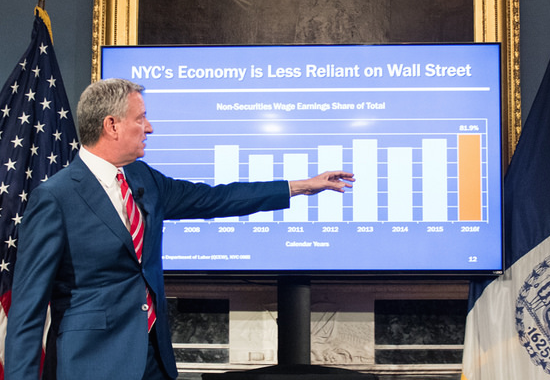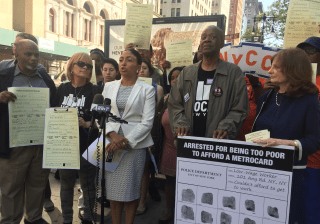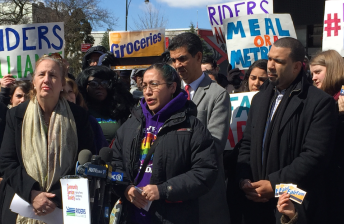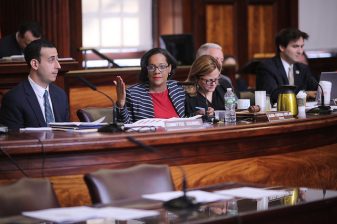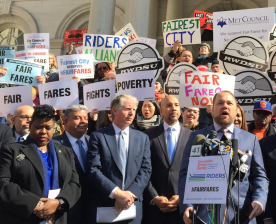Discount Fares for Low-Income New Yorkers Still Missing From de Blasio’s Budget
The mayor insists the program should be administered by the MTA, not the city.
Mayor de Blasio did not add funds for discount transit fares for low-income New Yorkers in his executive budget, released yesterday.
The “Fair Fares” coalition has called on the mayor to fund half-priced MetroCards for the 800,000 New Yorkers living under the federal poverty line, estimated to cost the city $212 million annually.
The proposal has the support of most of the City Council. Earlier this month, Council leaders called on de Blasio to allocated $50 million in FY 2018 to begin a phase-in of the program.
The city already contributes to discount fares for seniors and students (with the state also chipping in for student MetroCards), but de Blasio has repeatedly argued that this particular proposal should be the responsibility of the state, since the MTA is a state agency. He reiterated that point yesterday when asked whether he considered funding the Council’s incremental version.
“Look, the Fair Fares proposal is a very good idea that we should not do as a city expenditure. It’s $200 million — that’s a huge amount. It should be the responsibility of the MTA,” de Blasio told Gotham Gazette’s Ben Max. “It’s a good thing, but in a world of choices, one, we have other things, I think, [that] are even more strategically important. But that’s beside the point: Structurally, it should be the responsibility of the MTA. I really strongly believe that.”
It’s true that the MTA is led by Governor Cuomo, who appoints agency leadership, controls the most votes on the MTA board, and sets spending levels in the state budget. But like the discounts for seniors and students, “Fair Fares” is specifically for city residents.
The Citizens Budget Commission’s Maria Doulis noted in her response to de Blasio’s position that if the MTA funded the program, it would not be paid for by the broad base of all New York City residents, but by a financial transfer from other riders. (That is what the student MetroCard discount, which started out as a joint responsibility of the state, city, and MTA, has essentially become, as the MTA’s share of the cost has steadily risen.)
“Subsidizing services to the poor with higher fares for other riders makes little sense,” Doulis writes. “A broad tax base that draws resources from all wealthier New Yorkers, not just those relying on the subway, should back the commitment to broader opportunity.”
“It’s the city’s responsibility to help folks get out of poverty and it’s reasonable for New Yorkers to ask of their mayor to help them get to work, and to childcare, and out of poverty,” Riders Alliance organizer Rebecca Bailin told Streetsblog. “The mayor should step in where the governor hasn’t. We have an extremely underfunded MTA, and we’re fighting to improve that, but there are certain populations that are completely locked out.”
Bailin questioned why discount fares for low-income New Yorkers are not “strategically important” for the mayor, who was elected on a platform of fighting economic inequality, while projects that serve fewer people like the proposed Brooklyn-Queens streetcar and citywide ferry service are given top priority.
“If he thinks it’s a good idea, he should certainly do it,” Bailin said. “I don’t see why this policy, but not the [ferries or streetcar], [is] for the state and not for the city.”
